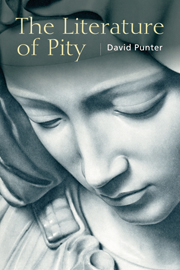Book contents
- Frontmatter
- Contents
- Plates
- Preface
- Acknowledgements
- 1 Distinguishing Pity
- 2 Pity and Terror: The Aristotelian Framework
- 3 Pietà
- 4 Shakespeare on Pity
- 5 The Eighteenth Century
- 6 Blake: ‘Pity would be no more …’
- 7 Aspects of Victoriana
- 8 Chekhov and Brecht: Pity and Self-Pity
- 9 ‘War, and the pity of War’: Wilfred Owen, David Jones, Primo Levi
- 10 Reflections on Algernon Blackwood's Gothic
- 11 Pity's Cold Extremities: Jean Rhys and Stevie Smith
- 12 Reclaiming the Savage Night
- 13 ‘Pity the Poor Immigrant’: Pity, Diaspora, the Colony
- 14 Lyric and Pity
- After Thought: Under the Dome
- Notes
- Bibliography
- Index
14 - Lyric and Pity
Published online by Cambridge University Press: 05 September 2014
- Frontmatter
- Contents
- Plates
- Preface
- Acknowledgements
- 1 Distinguishing Pity
- 2 Pity and Terror: The Aristotelian Framework
- 3 Pietà
- 4 Shakespeare on Pity
- 5 The Eighteenth Century
- 6 Blake: ‘Pity would be no more …’
- 7 Aspects of Victoriana
- 8 Chekhov and Brecht: Pity and Self-Pity
- 9 ‘War, and the pity of War’: Wilfred Owen, David Jones, Primo Levi
- 10 Reflections on Algernon Blackwood's Gothic
- 11 Pity's Cold Extremities: Jean Rhys and Stevie Smith
- 12 Reclaiming the Savage Night
- 13 ‘Pity the Poor Immigrant’: Pity, Diaspora, the Colony
- 14 Lyric and Pity
- After Thought: Under the Dome
- Notes
- Bibliography
- Index
Summary
This is the last chapter, and it is about Bob Dylan, who I think is one of the great writers of pity of our time. In ‘Chimes of Freedom’ (1964), for example, he refers to pity for the homeless, for the ‘countless confused, accused, misused, strung-out ones an' worse’, for the refugee, for the victim; and this might serve to introduce his texts, complex as they are, as among the most significant writings of pity, or perhaps more appositely, great songs of pity. The examples are legion, and run right through the work, no matter what the societal or religious framework. ‘Chimes of Freedom’ itself, of course, with the bells ‘tolling for the deaf an’ blind, tolling for the mute / Tolling for the mistreated, mateless mother, the mistitled prostitute’, is a tremendous work of pity. But also, outstandingly, we might think back to ‘Ballad of Hollis Brown’ (1963), with its ‘seven breezes a'blowin’ / All around the cabin door’, and the catastrophic deaths which ensue. Or we might include in the repertoire ‘The Lonesome Death of Hattie Carroll’ (1964), when it takes so agonisingly long for it to be finally time to ‘bury the rag deep in your face’ because ‘now's the time for your tears’.
- Type
- Chapter
- Information
- The Literature of Pity , pp. 155 - 166Publisher: Edinburgh University PressPrint publication year: 2014

